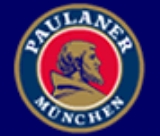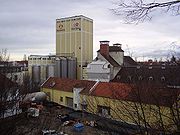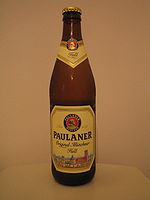
Paulaner
Encyclopedia
Paulaner is a German
brewery
, established in the early 17th century in Munich
by the Minim
friar
s of the Neudeck ob der Au cloister
. The mendicant order and the brewery are named after Francis of Paola
, the founder of the order.
Paulaner ranks number 8 among Germany's best selling breweries.
 The name of the Paulaner brewery refers to the order of friars that resided in Neuhauser Straße in Munich
The name of the Paulaner brewery refers to the order of friars that resided in Neuhauser Straße in Munich
who were part of the order of Saint Francis of Paola. The monks had brewed beer for their own use since 1634. The beer that was permitted to be sold on holidays was a Bock
style which gained local fame. After the abolition of the Neudeck Cloister in 1799, the building was converted into a penitentiary. Franz Xaver Zacherl, the brewer, purchased the former cloister brewery and continued the "Starkbier" tradition with the product Salvator
, which is Latin for "Saviour". In 1861 the "Salvatorkeller" (Salvator cellar) was opened upon Nockherberg. In 1928 the brewery merged with the Gebrüder Thomas brewery creating Paulaner Salvator Thomas Bräu. 1994 saw the acquisition into the Kulmbacher brewery group with the affiliated producers Plauen and Chemnitz. A daughter company is the Auer Bräu AG Rosenheim. Paulaner belongs to the BHI (Brau Holding International AG), a joint venture between Schörghuber Ventures (50.1%) and with the Netherlands' Heineken N.V. (49.9%).

Germany
Germany , officially the Federal Republic of Germany , is a federal parliamentary republic in Europe. The country consists of 16 states while the capital and largest city is Berlin. Germany covers an area of 357,021 km2 and has a largely temperate seasonal climate...
brewery
Brewery
A brewery is a dedicated building for the making of beer, though beer can be made at home, and has been for much of beer's history. A company which makes beer is called either a brewery or a brewing company....
, established in the early 17th century in Munich
Munich
Munich The city's motto is "" . Before 2006, it was "Weltstadt mit Herz" . Its native name, , is derived from the Old High German Munichen, meaning "by the monks' place". The city's name derives from the monks of the Benedictine order who founded the city; hence the monk depicted on the city's coat...
by the Minim
Minim (religious order)
The Minims are members of a Roman Catholic religious order of friars founded by Saint Francis of Paola in fifteenth-century Italy...
friar
Friar
A friar is a member of one of the mendicant orders.-Friars and monks:...
s of the Neudeck ob der Au cloister
Cloister
A cloister is a rectangular open space surrounded by covered walks or open galleries, with open arcades on the inner side, running along the walls of buildings and forming a quadrangle or garth...
. The mendicant order and the brewery are named after Francis of Paola
Francis of Paola
Saint Francis of Paola was an Italian mendicant friar and the founder of the Roman Catholic Order of the Minims.-Biography:...
, the founder of the order.
Paulaner ranks number 8 among Germany's best selling breweries.
History

Munich
Munich The city's motto is "" . Before 2006, it was "Weltstadt mit Herz" . Its native name, , is derived from the Old High German Munichen, meaning "by the monks' place". The city's name derives from the monks of the Benedictine order who founded the city; hence the monk depicted on the city's coat...
who were part of the order of Saint Francis of Paola. The monks had brewed beer for their own use since 1634. The beer that was permitted to be sold on holidays was a Bock
Bock
Bock is a strong lager of German origin. Several substyles exist, including maibock or helles bock, a paler, more hopped version generally made for consumption at spring festivals; doppelbock, a stronger and maltier version; and eisbock, a much stronger version made by partially freezing the beer...
style which gained local fame. After the abolition of the Neudeck Cloister in 1799, the building was converted into a penitentiary. Franz Xaver Zacherl, the brewer, purchased the former cloister brewery and continued the "Starkbier" tradition with the product Salvator
Bock
Bock is a strong lager of German origin. Several substyles exist, including maibock or helles bock, a paler, more hopped version generally made for consumption at spring festivals; doppelbock, a stronger and maltier version; and eisbock, a much stronger version made by partially freezing the beer...
, which is Latin for "Saviour". In 1861 the "Salvatorkeller" (Salvator cellar) was opened upon Nockherberg. In 1928 the brewery merged with the Gebrüder Thomas brewery creating Paulaner Salvator Thomas Bräu. 1994 saw the acquisition into the Kulmbacher brewery group with the affiliated producers Plauen and Chemnitz. A daughter company is the Auer Bräu AG Rosenheim. Paulaner belongs to the BHI (Brau Holding International AG), a joint venture between Schörghuber Ventures (50.1%) and with the Netherlands' Heineken N.V. (49.9%).


